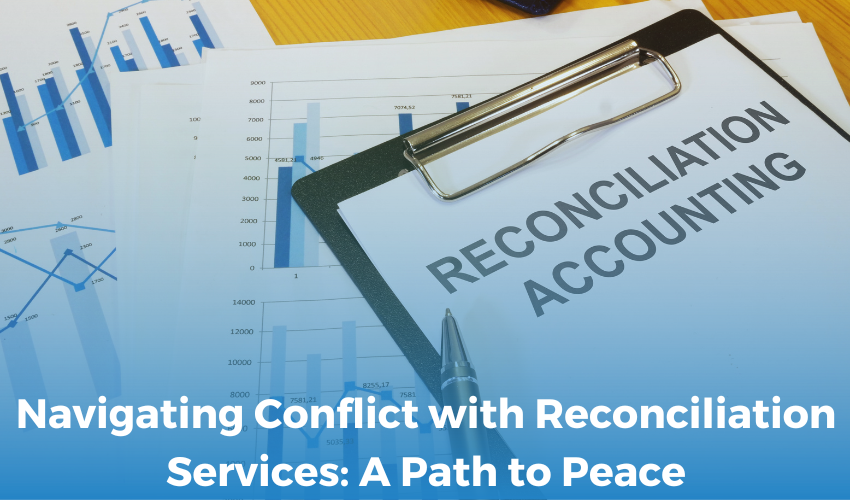

08-11-23
Conflict is an inevitable part of human existence. Whether it's disagreements with family members, conflicts at the workplace, or even disputes between nations, conflict is an intrinsic part of our lives. However, the way we deal with these conflicts can determine whether they lead to destructive outcomes or serve as a path to peace and resolution. In this blog, we will explore the importance of reconciliation services in navigating conflicts and how they can lead us towards a more harmonious world.
The Nature of Conflict
To understand the significance of reconciliation services, it's essential to first comprehend the nature of conflict. Conflict arises from differences in opinions, values, interests, and needs. It can manifest in various forms, from verbal arguments and disputes to violence and war. At the heart of most conflicts lies a breakdown in communication and an inability to empathize with the other party's perspective.
Conflicts can have profound and lasting impacts on individuals and communities. They can lead to emotional trauma, strained relationships, economic loss, and, in extreme cases, loss of life. Addressing conflicts effectively is not only a moral imperative but also crucial for maintaining peace and stability in society.
The Role of Reconciliation Services
Reconciliation services are designed to address conflicts in a constructive and peaceful manner. These services aim to foster understanding, empathy, and communication between parties in conflict, with the ultimate goal of reaching a mutually acceptable resolution. They can take various forms, such as mediation, arbitration, restorative justice programs, and peacebuilding initiatives.
Here are some key ways reconciliation services contribute to navigating conflicts:
Neutral Mediation: Reconciliation services often involve a neutral third party, such as a mediator, who facilitates communication between conflicting parties. Mediators help individuals or groups in conflict to express their concerns, listen to each other, and work together to find common ground. This impartial facilitation encourages open dialogue, reduces hostility, and paves the way for resolution.
Restorative Justice: In cases where conflicts have led to harm, restorative justice programs focus on repairing the harm caused and rebuilding trust. These programs allow victims and offenders to engage in a dialogue aimed at understanding the impact of their actions and working towards restitution and reconciliation.
Conflict Resolution Skills: Reconciliation services often include conflict resolution training, equipping individuals with the skills and tools to manage and prevent conflicts in the future. These skills can be valuable in personal relationships, workplaces, and broader societal interactions.
Cultural Sensitivity: In conflicts involving diverse cultural backgrounds, reconciliation services can be particularly effective. Mediators and facilitators are often trained in cultural sensitivity, which helps them navigate the complexities of intercultural conflicts and ensure that the resolution respects the values and norms of all parties involved.
Promoting Long-term Peace: Reconciliation services not only address immediate conflicts but also aim to create conditions for lasting peace. By addressing the root causes of conflicts and promoting understanding and cooperation, these services can contribute to building a more harmonious and peaceful society.
The Benefits of Reconciliation Services
The use of reconciliation services in conflict resolution offers numerous benefits, including:
Preservation of Relationships: By facilitating constructive dialogue, reconciliation services help preserve relationships that might otherwise be irreparably damaged by conflict. This is particularly valuable in personal and professional settings, where maintaining positive connections is crucial.
Cost-effective: Reconciliation services are often more cost-effective than pursuing legal or adversarial processes. They save time and money while achieving positive outcomes.
Empowerment: Individuals and communities involved in conflict gain a sense of empowerment when they are actively engaged in the resolution process. This can lead to long-lasting solutions and a reduction in the recurrence of conflicts.
Preventing Escalation: Addressing conflicts early through reconciliation services can prevent them from escalating into more severe and destructive forms of violence.
Community Building: Reconciliation services foster a sense of community and shared responsibility for conflict resolution. They encourage individuals to work together for the greater good, contributing to the social fabric of society.
Challenges and Criticisms
While reconciliation services have many advantages, they are not without their challenges and criticisms. Some common issues include:
Voluntary Participation: Participation in reconciliation services is often voluntary. In some cases, parties may refuse to engage in the process, making it challenging to achieve resolution.
Effectiveness and Fairness: The effectiveness of reconciliation services can vary, and the fairness of outcomes may be questioned. Mediators and facilitators must be skilled and impartial to ensure equitable results.
Complex Conflicts: Some conflicts are deeply rooted in historical, political, or socio-economic factors, making them exceptionally complex to resolve. Reconciliation services may not be sufficient in such cases without broader structural changes.
Resource Limitations: The availability of reconciliation services may be limited in some regions due to resource constraints, leaving many conflicts unaddressed.
Conclusion
In a world where conflicts are an integral part of human existence, reconciliation services provide a crucial path to peace and resolution. These services offer a way to navigate conflicts in a constructive, humane, and cost-effective manner. By fostering dialogue, empathy, and understanding, reconciliation services empower individuals and communities to find common ground, preserve relationships, and prevent conflicts from escalating into violence.
While challenges and criticisms exist, reconciliation services have proven their worth in various contexts, from family disputes to international conflicts. They play a pivotal role in building a more harmonious and peaceful world, one where conflicts are opportunities for growth and understanding rather than sources of division and destruction.
As we move forward, it's essential to recognize the importance of investing in reconciliation services in USA and promoting their use in our personal lives, workplaces, and societies. By doing so, we take a significant step toward a more peaceful and just world where conflicts are navigated with empathy, dialogue, and reconciliation, ultimately leading us on the path to lasting peace.
Read more: Reconciliation vs. Reconcile: What Every Business Owner Should Know
Tags :













































.jpg)
.jpg)
.jpg)
.jpg)


).jpg)














 Get A Quote
Get A Quote
Leave A Comment